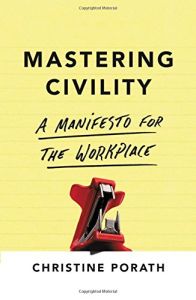Join getAbstract to access the summary!

Join getAbstract to access the summary!
Christine Porath
Mastering Civility
A Manifesto for the Workplace
Grand Central, 2016
What's inside?
Rediscover the lost art of an essential workplace skill: treating others with respect and courtesy.
Recommendation
How people treat each other matters. “Incivility” in the workplace is rampant and worsening. Organizations that ignore or allow bullying, rudeness, and other disrespectful behaviors suffer lost productivity and employee disengagement. Management professor Christine Porath conducted extensive research on workplace “civility,” surveying thousands of people worldwide in organizations large and small. Porath designed her practical guide for leaders who want to infuse civility into their corporate cultures and for individuals striving to exert a more positive influence. getAbstract recommends this manual on workplace relations to HR professionals, leaders, small-business owners and everyone whose mom already told them to be nice.
Summary
About the Author
Georgetown University associate professor of management Christine Porath consults with organizations on civility.




















Comment on this summary